Biographical Notes reCharles A. (Chuck) StonePage 1 of 3 Pages, of Chapter 4,HOMECOMING |
||||||||||||
|
Arriving home, as the winter season began to fade into spring of 1946, I quickly immersed myself in the mechanical and social elements that were so much a part of the hospitality business. It had never been our practice to serve meals at our Hotel and I saw no reason to change that element. Our property was located on the beautiful Fish Hook River, part of a chain of lakes and connecting rivers that were aligned from north to south from just south of Itaska State Park on down to Park Rapids. The earlier lumbering industry had floated White Pine logs down that chain to a sawmill located in Park Rapids. The demand for electrical power had long ago inspired residents to build a dam on the river, about seven city blocks south of our Hotel. This created a holding pond that backed up almost all the way to Fish Hook Lake, about a mile above our Hotel. With the sawmill closed down long ago, this left our river as a great spawning ground for a variety of types of game fish, providing easy swimming beaches in what was then, clear and almost drinkable water. With the more ready availability of outboard motors, it was an easy, scenic ride up to Fish Hook Lake for a days fishing for Walleye, Northern Pike or Crappie. The best Bass fishing was in the river.
|
||||||||||||
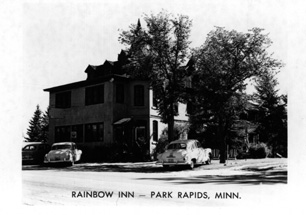 |
||||||||||||
|
|
||||||||||||
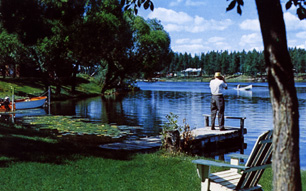 |
||||||||||||
|
|
||||||||||||
| As this transition of ownership began to take place, you should understand the makeup of our family population that were part of the heartbeat of the place. My Mother and Dad, Uncles Herb (a petroleum products and garage operator) and Ed (the disabled WW I vet and budding groundskeeper), were all living somewhere within the hotel building. My older sister, Pauline, a divorced mother of two, lived next door in what used to be Grandpa Stone’s house, and my sister, Bea, (mother of one, working for my Dad and the Minnesota Forest Service during the war, lived in the hotel while waiting to rejoin her military husband). I fitted myself (and soon after, my new wife, Nell) into this existing mix of family as gracefully as was possible within the limits of human behavior. After all of the paperwork was signed, I began to take on the duties and decision making processes for the business. My dad was still the Forest Ranger District Supervisor which fully occupied his work week. He would join my Mother and I in carrying out our duties in the evenings and weekends. We were a family that worked together almost continuously on workdays, weekends, holidays, days, evenings, and, as required, during the night, without knowing any better. We enjoyed what we did, helping our guests to enjoy themselves. If our business had any categorical divisions you might say that we had a year-round clientele of business-related travelers and salesmen. Then we had the gradual buildup of tourist-related guests that began in the spring, through the summer, and tapering off into the fall. It was a most congenial atmosphere. We had guests that had come back, some week after week, some year after year, that could remember me as a young child back into the early 1930’s. The Rainbow Inn was known as a “home away from home” to a rather extended segment of the traveling public. |
||||||||||||
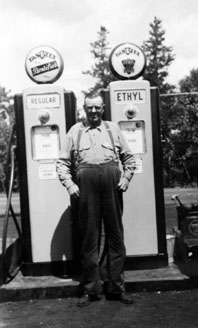 |
||||||||||||
|
Below: Uncle Eddie Wiediger |
||||||||||||
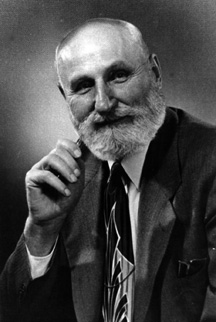 |
||||||||||||
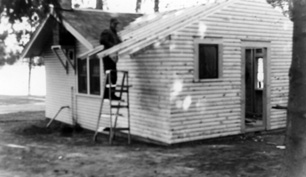 |
As the winter faded and I was buck-sawing wood into lengths that would fit into our hungry furnaces, I would often look to the sky and see a red and black Taylorcraft airplane moving through the air of a clear blue sky, tickling my memories of flying. While stimulated, I strived to resist the urge to head for the new and more formal airport, recently developed, just south of Park Rapids. I had work to do. |
|||||||||||
|
|
||||||||||||
| As spring began to break, I began a process of remodeling and upgrading the quality and amenities of our property that included the hotel and our six cabins down along the river . All of our facilities were very much in need of serious upgrading to meet the growing expectations of our clientele. Just having a bathroom down the hall or somewhere on the cabin-grounds was no longer the answer for many post WW II travelers. In the old part of the hotel ( the original hospital), we began a serious process of adding bathrooms, rewiring, reflooring, redecorating. My do-it-yourself instincts were not up to all of this, our credit in the community was good, so we had an increasing number of contractors coming and going. We did all of this while not missing a beat with our customers. It was both challenging and a joyful, forward-looking experience.
In the middle of all of this, as was true in every home town in America, there was a great sense of “coming home” of young men and women, too-long separated, getting back together. What an energetic social and sorting out process was going on. The dance halls were booming. People were moving from place to place and there were times when our facilities were filled to the brim and latecomers would say “Would you mind if we just slept on a rug in the parlor.” We did everything in our power to take care of them. In the midst of all of this hubbub, I had, along with a friend, become involved in the joint purchase of that black and red, two seater, Taylorcraft airplane. I was taking my breaks from work by putting in a few flying hours. About the same time the “love bug” really bit me when I was reintroduced to Nellie Anderson, the young lady I had met so fleetingly while home on graduation leave from pilot training. As was easy to do in that climate of coming back together, we found ourselves in a serious relationship in a very short time. This began a problem of a conflicting overlap of courting time and hotel/resort operation duties. |
||||||||||||
| Nell had an older brother, Buddy, who had been a combat infantryman and ski trooper in Alaska, Italy and Germany during the war. He had returned to their home town of Little Falls, Minnesota, and started up a Taxi business. About midsummer, he chose to take one of the calls himself because he had a strange feeling he couldn’t fully identify. On that run he was murdered by a young man, recently released from a mental institution, in a robbery attempt. They eventually apprehended the killer, the bloody taxi was recovered in Northern Minnesota, but it took about six weeks for them to find his body in a cornfield on a remote part of the killer’s parents family farm in the local area. It seemed especially tragic for Buddy to have survived the combat of WW II and to have his short and valuable life ended in this fashion. It was a heart-rending funeral for Nell’s mother, six surviving children and their many friends. Nell lost another brother, due to tuberculosis, within the next two years. Yet another family tragedy. |
||||||||||||
|
End of Page 1 of 3 Pages, Chapter 4 — Go to Page 2 Click below to select a destination Go to Page 1 — 2 — 3, this Chapter Chapters 1 — 2 — 3 — 4 — 5 — 6 — 7 — 8 — 9 — 10 |
||||||||||||